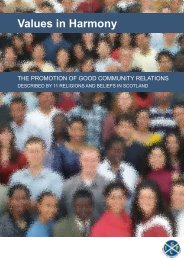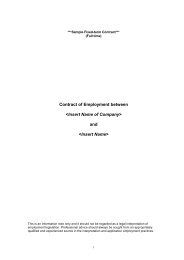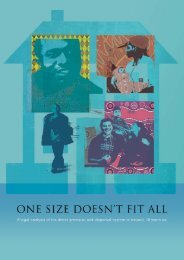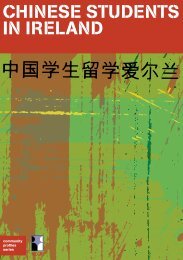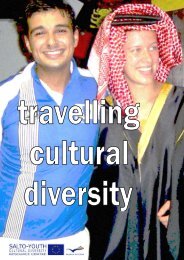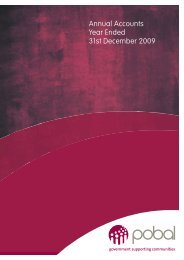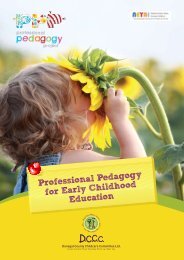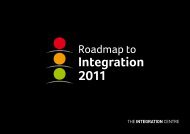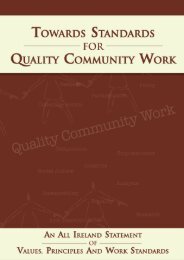Intercultural Education in the Post-Primary School - National Council ...
Intercultural Education in the Post-Primary School - National Council ...
Intercultural Education in the Post-Primary School - National Council ...
Create successful ePaper yourself
Turn your PDF publications into a flip-book with our unique Google optimized e-Paper software.
INTERCULTURAL EDUCATION ACROSS THE CURRICULUM 5overcom<strong>in</strong>g prejudice and stereotyp<strong>in</strong>g.Many of <strong>the</strong> <strong>the</strong>mes covered <strong>in</strong> Science,such as water, energy and ecology offergreat opportunity for cross-culturalcomparisons and learn<strong>in</strong>g.The Junior Certificate Science Syllabusadvises that <strong>the</strong> historical impact of scienceand society should <strong>in</strong>fluence <strong>the</strong> teach<strong>in</strong>gof <strong>the</strong> course. An appreciation of howscience has evolved is vital lest students areleft with an image of <strong>the</strong> scientist as awhite western male work<strong>in</strong>g <strong>in</strong> a high techlab. This image fails to recognise <strong>the</strong>contribution of many people over <strong>the</strong>centuries and <strong>in</strong> <strong>the</strong> develop<strong>in</strong>g world toscientific discoveries. The development ofscientific knowledge and <strong>the</strong> processes ofscientific exploration represent <strong>the</strong>cumulative work of many cultures andethnic groups over time, and it is on-go<strong>in</strong>g<strong>in</strong> all parts of <strong>the</strong> world. Therefore it isimportant that care is taken <strong>in</strong> choos<strong>in</strong>gscientific examples, to ensure that <strong>the</strong>contributions of diverse peoples tocontemporary scientific practices andknowledge are reflected. The Scienceteacher can also show how low tech andenvironmentally friendly solutions areappropriate and cost effective <strong>in</strong> address<strong>in</strong>gmodern problems.Because Science is a process of<strong>in</strong>vestigation as well as a body ofknowledge <strong>the</strong> syllabus encourages <strong>the</strong>teacher to provide <strong>the</strong> student withopportunities to conduct <strong>in</strong>vestigative andexperimental work. Incorporat<strong>in</strong>g an<strong>in</strong>tercultural perspective <strong>in</strong>volves focus<strong>in</strong>gon <strong>the</strong> methodologies as well as <strong>the</strong><strong>the</strong>oretical content of <strong>the</strong> class-work. In<strong>in</strong>vestigative work, where possible, groupwork should be encouraged and chang<strong>in</strong>gof <strong>the</strong> group members over time canencourage collaboration by students ofdiverse abilities, ages, ethnic backgroundsand gender.A detailed audit of <strong>the</strong> opportunities for<strong>in</strong>clud<strong>in</strong>g <strong>in</strong>tercultural <strong>the</strong>mes <strong>in</strong> Science aswell as sample lessons can be found on <strong>the</strong>CD-ROM and at www.ncca.ie.Social, Personal and Health<strong>Education</strong>The understand<strong>in</strong>g, knowledge, attitudes,values, skills and capacities of <strong>in</strong>terculturaleducation are <strong>in</strong>tegrated across a range ofmodules with <strong>the</strong> SPHE programme.These <strong>in</strong>cludeBelong<strong>in</strong>g and <strong>in</strong>tegrat<strong>in</strong>gThrough <strong>in</strong>vestigat<strong>in</strong>g this <strong>the</strong>me studentscan move towards a deeper appreciation ofhow belong<strong>in</strong>g and <strong>in</strong>tegrat<strong>in</strong>g can meandifferent th<strong>in</strong>gs to different students andyet <strong>the</strong>re are also many similarities. It isimportant to be aware that students maycome to <strong>the</strong>se learn<strong>in</strong>g experiences withdifferent cultural perspectives which mayeffect how <strong>the</strong>y participate, e.g. childrenfrom a Traveller background may have adifferent experience of ‘family’ than <strong>the</strong>settled community. Travellers for <strong>the</strong> mostpart, live <strong>in</strong> close relationship with <strong>the</strong>irextended family. This would not be true ofmany students <strong>in</strong> <strong>the</strong> settled community.The <strong>in</strong>fluences on both sets of students willbe different. Children from a Muslimbackground may have a different outlookon alcohol to children brought up <strong>in</strong> aChristian tradition.Differences and similaritiesThis module <strong>in</strong>vites <strong>the</strong> students to explorehow we are different and how are wesimilar? How might this awareness effecthow we behave towards one ano<strong>the</strong>r?How can we be respectful <strong>in</strong> our<strong>in</strong>teractions with one ano<strong>the</strong>r?Physical healthThere are a number of culturally sensitiveareas that may arise <strong>in</strong> this module, for<strong>Intercultural</strong> <strong>Education</strong> <strong>in</strong> <strong>the</strong> <strong>Post</strong>-<strong>Primary</strong> <strong>School</strong> 75




